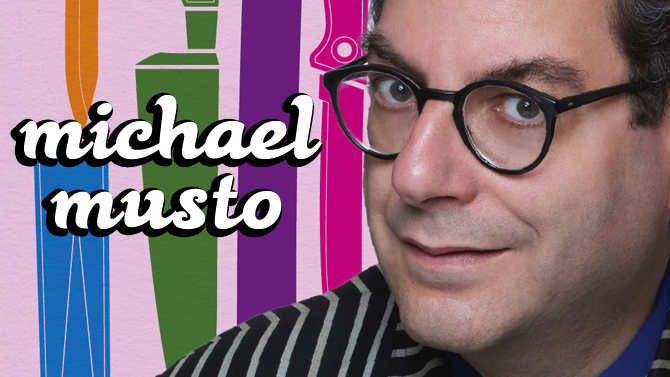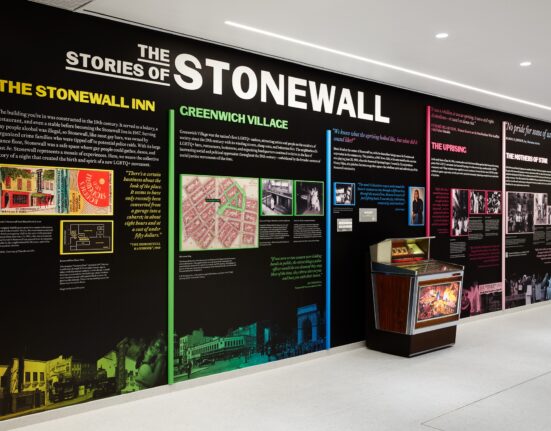Michael Musto has tapped into the pulse of New York City’s nightlife, celebrity and gay scene for more than 25 years as a columnist for the Village Voice. The Brooklyn native has come to be a local—if not national—celebrity in his own right, seen just as often riding his bicycle around town and popping into nightclubs as he is rubbing elbows with the rich and famous and appearing in documentaries, on talk shows and in Hollywood films.
He has outed celebrities (Rosie O’Donnell, Ellen DeGeneres) and made plenty of enemies along the way (Madonna, for one), but Musto sees himself as more than just a gossip columnist. Having given a voice to the AIDS movement when no one else dared utter the word, and championing issues from hate crimes to gay bullying to same-sex marriage in more recent years, Musto often sets aside his characteristic banter to become a crusader for gay rights. Treading the line between salacious snark and adamant advocacy, Musto knows what matters to gay New Yorkers, those who love us and those who hate us. When he talks, everyone listens.
You have been documenting the New York nightlife and social scene in the Village Voice for more than two decades now. How has the scene, especially gay nightlife, changed over the years?
New York went through a massive overhaul in the ’90s when Guiliani took over as mayor and sanitized the city, as if it were a Disney production. The Club Kid scene imploded, and things became very bottle service-y and lounge. It was really hard to open a dance club. So the whole mood of the city changed and became more about flaunting money as opposed to flaunting eccentricities. I’m hoping that with the recession there will be a resurgence of old school, flamboyant gay nightlife, but I’m not holding my breath.
There have been dramatic changes over the years. It’s really amazing gay nightlife is still flourishing to the extent that it is. There are plenty of gay bars out there. The big change has been sex online via Manhunt, Grindr or whatever. That took a lot of the sexual urgency out of going to a bar, where you had to meet somebody before you got home. Now, you’ve already had sex before you go out to the bar, and then come home and hook up with somebody else. It takes away some of the fun of the sexual cat and mouse game.
Do you miss the “old days,” so to speak?
I don’t really look back. I’ve been through so much I would go nuts if I looked back when things were better. I started out in the ’70s at Studio 54, the ultimate nightclub. It was baptism by fire. It emerged to be the best nightclub in history. I try not to hark back to the golden days of nightlife—it is for the young, not for me anymore.
In one of the last pieces in your book you list no less than 41 reasons why you hate New York City, but in the end you say you could never leave. This is especially telling coming from someone who has spent his entire life here. Why does New York have that power over people?
New York is always going to be the #1 destination for offbeat people who may have been made fun of or put down in their hometown, but come here and create a family and celebrate what they used to be made fun of for. Even though I grew up in Brooklyn, I always felt like an out-of-town outcast. When I emerged in the club scene, the gay scene in Manhattan, I felt connected with a group of people I wanted to be with forever. That’s the appeal of New York. It’s the forefront of culture and trends and fashion and anything that people aesthetically care about. I’ve been all over the world—LA is a wasteland culturally.
Newspapers are arguably a dying business as more people are turning to Web for their news and entertainment. I think you have thrived in the online world as well as you have in print. How has the Web and social media changed how you do what you do?
In the old days I used to write a weekly column for the newspaper, and that was the extent of my job. Now I’m blogging all day, Twittering—or is it Tweeting?—and Facebook[ing] my blog posts so they go out to a larger audience. I’m working three times harder but reaching a wider audience and getting out my info faster. No longer do I have to wait until Wednesday’s newspaper for my gossips to hit. I can put late-breaking info out immediately. It’s fun to start a conversation with people, throw out these blog posts filled with opinions and immediately people weigh in on how they feel on a subject. They feel like you started a dialogue. I resisted at first—Oh no, I have to blog!—but now I can’t imagine not.
Your latest book is dedicated “To everyone who is still speaking to me.” I’m sure you have ruffled some feathers over the years. Who isn’t speaking to you anymore?
I’ll give you the phonebook. I walk into a room and half the people cower. That’s good—I wouldn’t be doing my job if that didn’t happen. Sometimes it feels like one long rant. A lot of it—I just like to get things off my chest, and that’s probably why I don’t have to go to therapy. I’m not doing what I do to be a friend with celebrities. I’m not kissing their ass or trying to hang out with Meryl Streep. I tell the truth when celebrities mess up. The gay crowd, I cut them some slack. I’m not mean about drag queens. We are in the same boat—oppressed people fighting to survive. I’m not going to knock down a drag DJ like I would an Oscar superstar. In the old days I used to out people, [like] Rosie O’Donnell.
So that was you?
She called me a gay Nazi. It was a big mess. It’s hard for people to believe she was actually in the closet at one time. All the people I’ve outed, once they came out it’s cool. Friends now.
You obviously have a fascination with celebrities, and you tend to rub elbows with stars fairly regularly. What has been the most interesting, bizarre or awkward experience you have had with a celebrity? Anyone particularly strange in person?
Wow. Usually celebrities are exciting and fun. I sort of have a history with Madonna. We never speak to each other—it’s very awkward. I know her from the old days and thought she was egomaniacal. My prediction at the time that she wouldn’t go anywhere didn’t turn out. [laughs] I think I was a little off base, because she did OK.
Who else is awkward? I always ask awkward questions and people get uncomfortable. Gwyneth Paltrow said, “I admire your rage.” Whoopi [Goldberg] sent me a telegraph once saying, “Get a life.”
What had you done to Whoopi?
She was still carrying on about The Color Purple and the lesbian kiss and how it got a negative reaction. I wrote something like, “Shut up already about it.” And she said to get a life.
I saw your cameo on the Smurfs movie this summer. Did you get to meet Papa Smurf?
We didn’t work with the Smurfs, unfortunately. I was so looking forward to meeting Smurfette. I did get to work with Sofia Vergara. I had a line with Joan Rivers and Tim Gunn, but they cut that whole sequence. It was really fun to be the talent for a change. Tip-top treatment.
What has been your favorite story you have ever written? What has been the most important?
I think at the height of the early days of the AIDS movement. Young people are not going to know how huge the impact of AIDS was when it first hit. There was no response. Nobody knew what to do, and there wasn’t even knowledge about how to approach it. I relentlessly wrote columns about Act Up and different protests and rallies. It was important because it brought a consciousness to the public. But I would go right back to writing about silly parties.
Do you feel an obligation or responsibility to cover issues important to the gay community?
I feel I need to constantly let my readers know about bad things going on in the community. It’s not just AIDS. It’s gay bashing and homophobia, even within our own community. Something trivial like “Dancing with the Stars” having Chaz [Bono] as an opposite-sex couple but never considering having a same-sex couple. I think the culture we see around us is sending messages to people, and it’s appalling that they think a gay couple would be off limits.
I’m more outspoken. I’ve burned a lot of bridges. I can’t call Vogue and write for them. They’re not going to hire me. But it’s my responsibility. I’m not going to wait for other people to do it, because they won’t address these things. I’ve been openly gay from the beginning. I’m not afraid if someone is going to “find me out.”
Michael Musto’s latest book, Fork on the Left, Knife in the Back, is a compilation of selected pieces from his column in the Village Voice. It is available now in bookstores and on Amazon.



Leave feedback about this
You must be logged in to post a comment.